英语虚拟语气
英语虚拟语气讲解
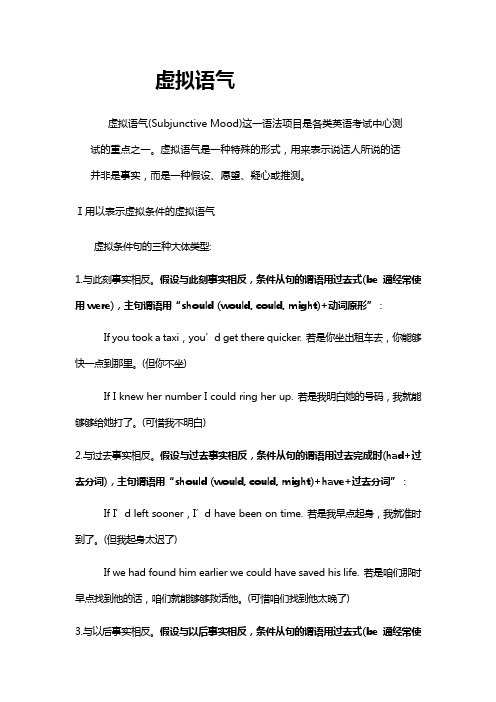
虚拟语气虚拟语气(Subjunctive Mood)这一语法项目是各类英语考试中心测试的重点之一。
虚拟语气是一种特殊的形式,用来表示说话人所说的话并非是事实,而是一种假设、愿望、疑心或推测。
Ⅰ用以表示虚拟条件的虚拟语气虚拟条件句的三种大体类型:1.与此刻事实相反。
假设与此刻事实相反,条件从句的谓语用过去式(be通经常使用were),主句谓语用“should (would, could, might)+动词原形”:If you took a taxi,you’d get there quicker. 若是你坐出租车去,你能够快一点到那里。
(但你不坐)If I knew her number I could ring her up. 若是我明白她的号码,我就能够够给她打了。
(可惜我不明白)2.与过去事实相反。
假设与过去事实相反,条件从句的谓语用过去完成时(had+过去分词),主句谓语用“should (would, could, might)+have+过去分词”:If I’d left sooner,I’d have been on time.若是我早点起身,我就准时到了。
(但我起身太迟了)If we had found him earlier we could have saved his life. 若是咱们那时早点找到他的话,咱们就能够够救活他。
(可惜咱们找到他太晚了)3.与以后事实相反。
假设与以后事实相反,条件从句的谓语用过去式(be通经常使用were),主句谓语用“should (would, could, might)+动词原形”:If he went,would you go too? 若是他去,你也去吗?(可能他可不能去) If I asked him,I’m sure he’d help us. 若是我向他提出要求,确信他会帮忙咱们。
(只是我不打算如此做)大多数的虚拟条件句属于上面三种情形的一种,但并非排除存在条件和后果中,一个和此刻情形相反,另一个和过去情形相反,例如:If you had followed what the doctor said, you would not have been so painful now.那个句子在高中显现频率颇高。
(完整版)英语虚拟语气语法归纳总结
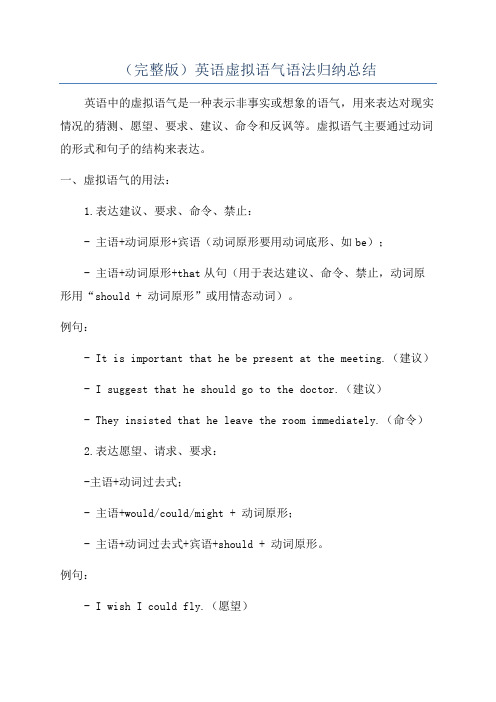
(完整版)英语虚拟语气语法归纳总结英语中的虚拟语气是一种表示非事实或想象的语气,用来表达对现实情况的猜测、愿望、要求、建议、命令和反讽等。
虚拟语气主要通过动词的形式和句子的结构来表达。
一、虚拟语气的用法:1.表达建议、要求、命令、禁止:- 主语+动词原形+宾语(动词原形要用动词底形、如be);- 主语+动词原形+that从句(用于表达建议、命令、禁止,动词原形用“should + 动词原形”或用情态动词)。
例句:- It is important that he be present at the meeting.(建议)- I suggest that he should go to the doctor.(建议)- They insisted that he leave the room immediately.(命令)2.表达愿望、请求、要求:-主语+动词过去式;- 主语+would/could/might + 动词原形;- 主语+动词过去式+宾语+should + 动词原形。
例句:- I wish I could fly.(愿望)- I would appreciate it if you could help me.(请求)3.表示虚拟条件:- If条件从句中的谓语动词用过去完成时,主句用would/should/might/could + have + 过去分词;- If条件从句中的谓语动词用过去时,主句用would/should/could + 动词原形。
例句:- If I had known his phone number, I would have called him.(虚拟条件)- If you had listened to me, we could have finished the project earlier.(虚拟条件)4.表达建议、要求、祝愿:- If only内部称述 + 主语 + 过去式。
英语中三种虚拟语气
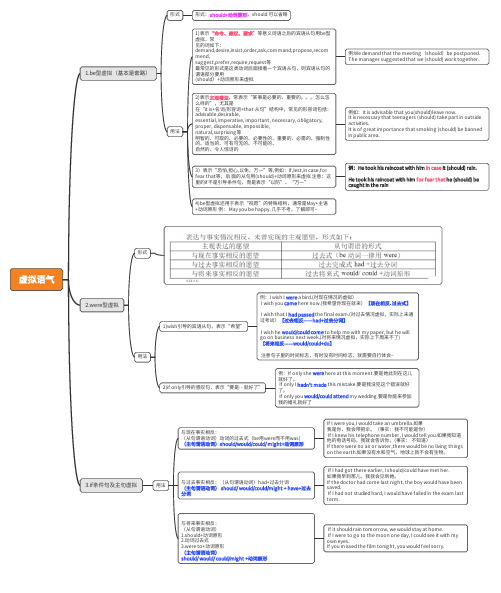
虚拟语⽓1.b e型虚拟(基本是套路)2.w ere型虚拟3.if条件句及主句虚拟形式⽤法⽤法1)表⽰“命令、建议、要求”等意义词语之后的宾语从句⽤b e型虚拟,常⻅的词如下:d e m an d,d es i re,i ns i s t,or d er,as k,co mm an d,p ro p ose,reco mm en d,sugges t,p re f er,re q u i re,re q ues t等最常⻅的形式是这类动词后⾯接着一个宾语从句,则宾语从句的谓语部分要⽤(s h oul d)+动词原形来虚拟2)表⽰主观看法,常表⽰“某事是必要的、重要的。
怎么怎么样的”,尤其是在“it i s+名词/形容词+th a t 从句”结构中,常⻅的形容词包括:a dvi sab le,d es i ra b le,essen ti al, imp era tiv e, imp or t an t, necessar y, o b l i ga t or y,p ro p er, di s p ensa b le, imp oss ib le,na t ural,sur p r i s i ng等明智的、可取的、必要的、必要性的、重要的、必需的、强制性的、适当的、可有可⽆的、不可能的、⾃然的、令⼈惊讶的3)表⽰“恐怕,担⼼,以免,万一”等,例如:if,les t,i n case,f orf ear th a t等,后 ⾯的从句⽤(s h oul d)+动词原形来虚拟 注意:这⾥的if不是引导条件句,⽽是表⽰“以防”、“万一”4)b e型虚拟还⽤于表⽰“祝愿”的特殊结构,通常是M a y+主语+动词原形 例: M a y y ou b e h a ppy. ⼏乎不考,了解即可~与现在事实相反:(从句谓语动词)动词的过去式(b e⽤w ere⽽不⽤w as)(主句谓语动词)s h oul d/w oul d/coul d/ mi g ht+动词原形与过去事实相反:(从句谓语动词)h a d+过去分词(主句谓语动词) s h oul d/ w oul d/coul d/mi g ht + h a v e+过去分词与将来事实相反:(从句谓语动词)1.s h oul d+动词原形2.动词过去式3.w ere t o+动词原形(主句谓语动词)s h oul d/ w oul d/ coul d/mi g ht +动词原形形式:s h oul d+动词原形,s h oul d 可以省略If it s h oul d ra i n t o m orro w, w e w oul d s t a y a t h o m e.If I w ere t o go t o th e m oon one d a y, I coul d see it with myo w n e y es.If y ou mi sse d th e fi l m t on i g ht, y ou w oul d f eel sorr y.If I h a d go t th ere earl i er, I s h oul d/coul d h a v e m e t h er.如果我早到那⼉,我就会⻅到她。
高中英语语法:虚拟语气

---------------------------------------------------------------最新资料推荐------------------------------------------------------高中英语语法:虚拟语气虚拟1/ 35虚拟语气定义1.英语动词有三种语气: 陈述语气,祈使语气和虚拟语气。
2. 定义:用来表示说的话不是事实,或者是不可能发生或可能性比较小的情况,而是一种愿望,建议,假设的语气叫虚拟语气。
---------------------------------------------------------------最新资料推荐------------------------------------------------------ 虚拟语气的考点1.一般条件句中虚拟语气的用法; 2.条件句中虚拟语气的倒装; 3.名词性从句中虚拟语气的用法; 4.状语从句中虚拟语气的用法; 5.几种特殊结构中虚拟语气用法; 6.虚拟语气与陈述语气的判定。
3/ 35一般条件句中虚拟语气的用法---------------------------------------------------------------最新资料推荐------------------------------------------------------ 1.一般条件句中的虚拟语气时间过去If 条件句 had donewould should could might主句 +have done sth现在助动词 be用 were 实义动词 do 用 didwould should could might+ do sth将来did / were should do were to dowould should + do sth could Might5/ 35与现在事实相反1. If I had taken your advice, I wouldn’t have made a mistake.2. If he had been there, it wouldn’t have happened. 与过去事实相反3. If I had HIV, I would know becauseI would feel sick.4. If I were you, I would give AIDS patienta hug.---------------------------------------------------------------最新资料推荐------------------------------------------------------ 与未来事实可能相反5. If it should rain tomorrow, they wouldn’t go for an outing.6. I think we could do it, if we planned it properly and could borrow the tools.7. If we were to have three days off , we would enjoy a very happy life.7/ 351.If I were you, I _C___ buy the house right now. A. won’t B. don’t C. wouldn’t D. can’t2. _B____more careful, his ship would not have sunk.A. If the captain were B. If the captain had been C. Should the captain be D. If the captain would have been3. If he A___ me tomorrow, I would let him know. A. should call B. should not have been able C. were not able D. are not able---------------------------------------------------------------最新资料推荐------------------------------------------------------ 2.条件句中虚拟语气的倒装;条件从句中含有should,were, had 三个助动词可将其放在句首,并把if省略。
虚拟语气语法总结
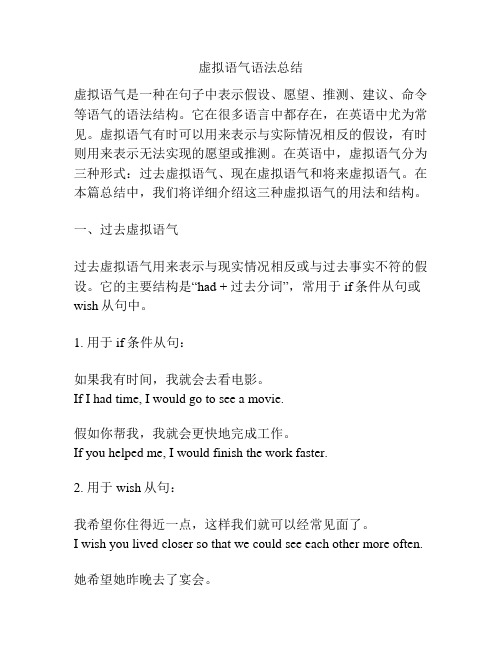
虚拟语气语法总结虚拟语气是一种在句子中表示假设、愿望、推测、建议、命令等语气的语法结构。
它在很多语言中都存在,在英语中尤为常见。
虚拟语气有时可以用来表示与实际情况相反的假设,有时则用来表示无法实现的愿望或推测。
在英语中,虚拟语气分为三种形式:过去虚拟语气、现在虚拟语气和将来虚拟语气。
在本篇总结中,我们将详细介绍这三种虚拟语气的用法和结构。
一、过去虚拟语气过去虚拟语气用来表示与现实情况相反或与过去事实不符的假设。
它的主要结构是“had + 过去分词”,常用于if条件从句或wish从句中。
1. 用于if条件从句:如果我有时间,我就会去看电影。
If I had time, I would go to see a movie.假如你帮我,我就会更快地完成工作。
If you helped me, I would finish the work faster.2. 用于wish从句:我希望你住得近一点,这样我们就可以经常见面了。
I wish you lived closer so that we could see each other more often. 她希望她昨晚去了宴会。
She wishes she had gone to the party last night.二、现在虚拟语气现在虚拟语气用来表示与现实情况相反或不太可能实现的愿望、建议、要求等。
它的主要结构是“should + 动词原形”或“were + to + 动词原形”。
1. 用于虚拟的愿望:如果我是你,我会马上辞职。
If I were you, I would quit my job immediately.(“were”表示与现实情况相反的假设)我希望你明白我的意思。
I wish you understood what I mean.(“understood”表示与现实情况不符的愿望)2. 用于虚拟的建议和要求:你应该尽早去看医生。
英语虚拟语气的三种时态
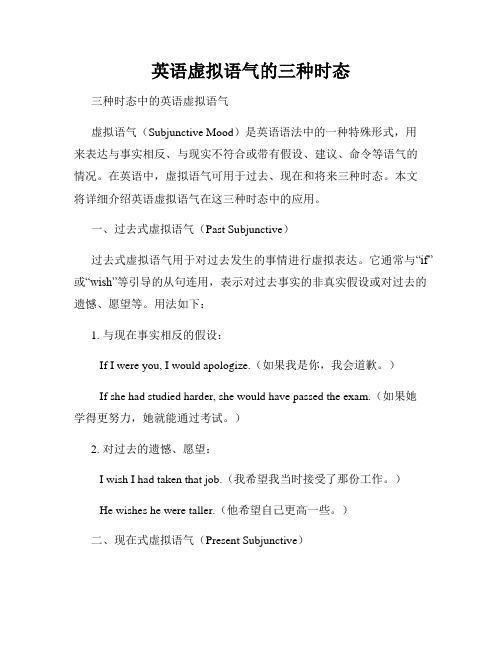
英语虚拟语气的三种时态三种时态中的英语虚拟语气虚拟语气(Subjunctive Mood)是英语语法中的一种特殊形式,用来表达与事实相反、与现实不符合或带有假设、建议、命令等语气的情况。
在英语中,虚拟语气可用于过去、现在和将来三种时态。
本文将详细介绍英语虚拟语气在这三种时态中的应用。
一、过去式虚拟语气(Past Subjunctive)过去式虚拟语气用于对过去发生的事情进行虚拟表达。
它通常与“if”或“wish”等引导的从句连用,表示对过去事实的非真实假设或对过去的遗憾、愿望等。
用法如下:1. 与现在事实相反的假设:If I were you, I would apologize.(如果我是你,我会道歉。
)If she had studied harder, she would have passed the exam.(如果她学得更努力,她就能通过考试。
)2. 对过去的遗憾、愿望:I wish I had taken that job.(我希望我当时接受了那份工作。
)He wishes he were taller.(他希望自己更高一些。
)二、现在式虚拟语气(Present Subjunctive)现在式虚拟语气用于对现在或将来的事情进行虚拟表达。
它通常与“if”或“suggest”等引导的从句连用,表示对现实的非真实假设、建议或要求。
用法如下:1. 对现在事实相反的假设:If it were to rain, we would stay at home.(如果下雨的话,我们将呆在家里。
)I suggest that he be more careful.(我建议他更加小心。
)2. 对现在的建议或要求:It is important that she arrive on time.(她准时到达是很重要的。
) They demanded that he pay the bill immediately.(他们要求他立即支付账单。
英语虚拟语气

英语虚拟语气摘要:一、英语虚拟语气的概念与分类1.定义2.分类二、英语虚拟语气的用法1.表示与现在事实相反的假设2.表示与过去事实相反的假设3.表示对未来事实的虚拟4.表示愿望、建议、命令等三、虚拟语气在各种从句中的应用1.名词性从句2.状语从句3.定语从句四、虚拟语气与其他语气的区别1.与条件语气的区别2.与推测语气的区别五、虚拟语气的注意事项1.形式的变化2.语气的转换3.语境的理解正文:一、英语虚拟语气的概念与分类1.定义英语虚拟语气(Subjunctive Mood)是一种表示说话者对某个动作或情况的真实性、可能性或期望的语气。
它用于表示与事实相反的假设、愿望、建议等。
2.分类根据用途和时态,英语虚拟语气可分为三类:(1)与现在事实相反的虚拟语气,如:If I were you,I would accept the job.(2)与过去事实相反的虚拟语气,如:If he had known the truth,he would have helped me.(3)表示对未来事实的虚拟,如:If it rains tomorrow,we will stay at home.二、英语虚拟语气的用法1.表示与现在事实相反的假设虚拟语气用于表示与现在事实相反的假设,如:If I were you,I would accept the job.2.表示与过去事实相反的假设虚拟语气用于表示与过去事实相反的假设,如:If he had known the truth,he would have helped me.3.表示对未来事实的虚拟虚拟语气用于表示对未来事实的虚拟,如:If it rains tomorrow,we will stay at home.4.表示愿望、建议、命令等虚拟语气可用于表示愿望、建议、命令等,如:I wish he would come to our party.三、虚拟语气在各种从句中的应用1.名词性从句在名词性从句中,如主语从句、宾语从句和表语从句,可以使用虚拟语气,如:What if I tell you that we can succeed?2.状语从句在表示条件、原因、目的等状语从句中,可以使用虚拟语气,如:If I were you,I would accept the job.3.定语从句在定语从句中,如用虚拟语气修饰的名词性从句,如:The man who would win the competition was my brother.四、虚拟语气与其他语气的区别1.与条件语气的区别虚拟语气与条件语气都表示假设,但虚拟语气更注重对事实的虚拟,而条件语气关注条件与结果之间的关系。
英语中虚拟语气用法总结
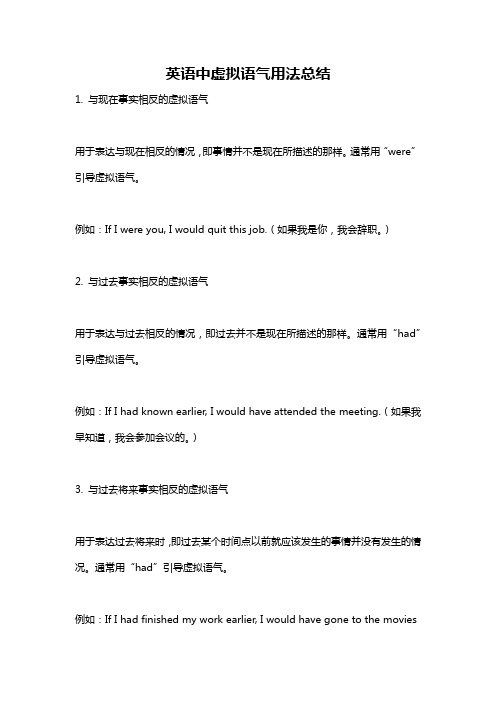
英语中虚拟语气用法总结1. 与现在事实相反的虚拟语气用于表达与现在相反的情况,即事情并不是现在所描述的那样。
通常用“were”引导虚拟语气。
例如:If I were you, I would quit this job.(如果我是你,我会辞职。
)2. 与过去事实相反的虚拟语气用于表达与过去相反的情况,即过去并不是现在所描述的那样。
通常用“had”引导虚拟语气。
例如:If I had known earlier, I would have attended the meeting.(如果我早知道,我会参加会议的。
)3. 与过去将来事实相反的虚拟语气用于表达过去将来时,即过去某个时间点以前就应该发生的事情并没有发生的情况。
通常用“had”引导虚拟语气。
例如:If I had finished my work earlier, I would have gone to the movieswith my friends.(如果我早点完成工作,我会和朋友去看电影的。
)4. 与现在将来可能性相反的虚拟语气用于表达现在将来的可能性,即可能会发生但不太可能的情况。
通常用“should”或“were to”引导虚拟语气。
例如:If I were to win the lottery, I would travel around the world.(如果我中了彩票,我会周游世界的。
)5. 与过去将来可能性相反的虚拟语气用于表达过去将来的可能性,即曾经可能会发生但最终却没发生的情况。
通常用“should”或“were to”引导虚拟语气。
例如:If I should fail the exam, I would have to retake it in three months.(如果我考试不及格,我就得三个月后再次参加考试。
)。
- 1、下载文档前请自行甄别文档内容的完整性,平台不提供额外的编辑、内容补充、找答案等附加服务。
- 2、"仅部分预览"的文档,不可在线预览部分如存在完整性等问题,可反馈申请退款(可完整预览的文档不适用该条件!)。
- 3、如文档侵犯您的权益,请联系客服反馈,我们会尽快为您处理(人工客服工作时间:9:00-18:30)。
虚拟语气的用法与高考必考知识点语气(mood)是一种动词形式,用以表示说话者的意图或态度。
英语中的语气有三种:陈述语气、祈使语气和虚拟语气。
直陈语气(indicative mood),表示所说的话是事实。
祈使语气(imperative mood),表示所说的话是请求或命令。
虚拟语气(subjunctive mood),表示说的话不是事实,或者是不可能发生的情况,而是一种愿望、建议或与事实相反的假设等。
一、虚拟语气在条件状语句中的应用条件句有真实条件句与非真实条件句(或称虚拟条件句)两种。
真实条件句所表的假设是可能发生或实现的,句中的条件从句与结果主句都用陈述语气。
如:If it doesn’t rain tomorrow, I will go for a picnic. 假若明天不下雨,我就去野餐。
Oil floats if you pour it on water. 你如把油倒在水里,油就浮起来。
虚拟条件句所表的假设则是不可能或不大可能发生或实现的,句中的条件从句与结果1. 与现在事实相反的虚拟条件句,条件从句的谓语用动词的过去式(be的过去式用were), 主句的谓语用should/would/might/could +动词原形。
如:If it were not raining, we should go for a picnic. 如果现在不下雨的话,我们就出去野餐了If he came here, he might be able to help you. 如果他来这,他就能够帮助你了。
2. 与过去事实相反的虚拟条件句,条件从句的谓语用had + 过去分词,主句的谓语should /would/might/could + have +过去分词。
如:She would have gone to the party if she had been invited.要是当初她被邀请的话,她就会去参加这次聚会了。
If she hadn't called me, I would have overslept this morning.今天早上,她要是不叫我的话,我就会睡过头了。
3. 与将来事实可能相反的虚拟条件句,条件从句的谓语用动词的过去式(be的过去式用were);should+动词原形;were to+动词原形,主句用should/would/might/could +动词原形。
如:If I were to be twenty years old next year, I would take the course of French.明年我要是二十岁,我就会学法语。
If it should fail, I would try again. 要是失败了,我会再试一次。
二、连词if的省略如果虚拟条件句的谓语部分有were,had和should时,可省略if,把were,had和should放到从句主语前面去,多见于书面语。
Had you not helped me,I should have failed. 要是没有你的帮助,我就失败了。
Were you in my position, you would do the same. 假如你处在我的地位,你也会这样干的。
Should they attack us, we’ll wipe them out completely. 假如他们进攻我们,我们就把他们彻底消灭干净。
三、情态动词+have +done的用法1.“could+have +done”是虚拟语气,表示对过去事情的假设,意思是“本来可以/能够做某事而没有做”。
1)He could have passed the exam, but he was too careless. 本来他能够通过考试,但是他太粗心。
2)We could have solved the problem in a more reasonable fashion. 这个问题我们本来是可以更合理得解决的。
3)He could have told her, but he did not choose to.他本来可以告诉她的,但他不愿这样做。
2. “may / might + have + 过去分词”表示对已发生的动作或存在的状态进行不肯定的推测,might的语气比may弱一点。
这种结构主要用于肯定句和否定句,意思是“可能已经”或“也许已经”,疑问句改用can或could。
1)—What has happened to George?—I don't know. He may have got lost.2)They may not have known it beforehand.3)He might have given you more help, even though he was busy.4)She might have achieved greater progress, if you had given her more chances.(5)You might have read about it in the papers.3. “would + have + done”虚拟语气,表示对过去事情的假设,意思是“本来会做”。
1)I would have told you all about the boy's story, but you didn't ask me. 我本来会告诉你这个小男孩的故事,但是你没有问我。
2)Without your help, I wouldn't have achieved so much. 没有你的帮助,我是不会取得如此大的成绩。
3)The victim would have a chance to survive if he had been taken to hospital in time. 4)Had you told me the matter earlier, I would not have done the foolish things. 要是你早点告诉我那件事,我也许就不会做那样的傻事。
4. “should + have + done”意思是“本来应该做某事,而实际没做”。
“shouldn't + have + done”表示本来不应该做某事,而实际做了。
含有指责对方或自责的含意。
1)Tom, you are too lazy. The work should have been finished yesterday. 汤姆,你太懒惰了,这项工作本来应该昨天就做完的。
2)Look, Tom is crying. I shouldn't have been so harsh on him. 看,汤姆哭了,我本来不应该对他如此严厉。
3)You shouldn’t /oughtn’t to have come here alone at such a late hour.你这么晚的时候本不一该一个人来这里的。
(实际是一个人来的)4)You should have come here ten minutes earlier. 你本应该早10分钟来才是。
5. “ought to+have+done”表示过去应该做而实际并没有做,译成“理应做……”,往往表示遗憾。
与“should+have+done”用法基本一样。
1)I ought to have gone home last Sunday. 我理应上星期日回家。
2)You ought not to have given him more help. 你不应该帮助他那么多。
6. “needn't + have + done”则表示“本来不需要做某事而做了”。
1)I needn't have bought so much wine—only five people came. 我本来没有必要买这么多酒,只来了五个人。
2)I needn’t have borrowed the money yesterday.昨天我根本不需要借钱的。
(实际上已经借了)四、虚拟语气在宾语从句中的应用(1)宾语从句在表示提议、要求、命令、意志等动词后,其谓语用should+动词原形或只用动词原形的虚拟语气,作为suggest,request,demand,propose,advise,insist,require,order,command等动词的宾语。
The doctor suggested that he not go there.医生建议他不要去那里。
He suggested that we should leave early. 他建议我们早点动身。
The judge ordered that the prisoner should be remanded. 法官命令被告还押。
(2)wish的宾语的从句,表示愿望,常省去连词that。
☆表示与现在事实相反的愿望,从句谓语用一般过去时或过去进行时;be动词统统都用wereI wish I knew everything in the world.I wish that the experiment were a success. I wish it were true.☆表示与过去相反的愿望,从句谓语用“had +过去分词”或“could/would/might/+have+过去分词”How she wished his family had gone with him?I wish you had called yesterday.We wish you had come to our New Year’s party.我们真希望你来参加了新年联欢会。
She wished she had stayed at home. 她后悔的是她当时要是留在家里就好了。
I wish that I could have gone with you last night.☆表示将来没有把握或不太可能实现的愿望,用would (could)+动词原形。
I wish you would stay a little longer. 我希望你再待一会儿。
I wish you wouldn’t smoke any more.我希望你不再抽烟了。
I wish that he could try again. I wish that someday I should live on the moon.五、虚拟语气在表语从句中的应用名词suggestion,proposal,order,advice,demand等作主语,其后的表语从句中的谓语动词一般使用虚拟语气,用should +动词原形或省略should。
